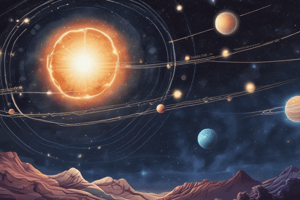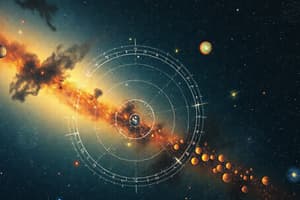Podcast
Questions and Answers
List the letters used to classify stars in order from hottest to coolest.
List the letters used to classify stars in order from hottest to coolest.
O B A F G K M
What classification of star has the hottest temperature?
What classification of star has the hottest temperature?
O
What classification of star has the smallest size?
What classification of star has the smallest size?
M
List the star classification that fits the colors: Blue/Violet, Blue, Blue/White, White, Yellow, Orange, Red.
List the star classification that fits the colors: Blue/Violet, Blue, Blue/White, White, Yellow, Orange, Red.
What classification of star is our sun?
What classification of star is our sun?
If you put all the stars in the universe side by side, would the sun have the largest absolute magnitude?
If you put all the stars in the universe side by side, would the sun have the largest absolute magnitude?
What is the name of the star at night that has the highest apparent magnitude?
What is the name of the star at night that has the highest apparent magnitude?
Fill in the blanks that label the X-Axis and Y-Axis of the H-R Diagram.
Fill in the blanks that label the X-Axis and Y-Axis of the H-R Diagram.
Name the six regions of the H-R Diagram.
Name the six regions of the H-R Diagram.
If a star has a high temperature but a low luminosity, in what region of the H-R Diagram would you find it?
If a star has a high temperature but a low luminosity, in what region of the H-R Diagram would you find it?
If a star has a low temperature but a very high luminosity, in what region of the H-R Diagram would you find it?
If a star has a low temperature but a very high luminosity, in what region of the H-R Diagram would you find it?
In what region of the H-R Diagram would you find our sun?
In what region of the H-R Diagram would you find our sun?
In what region of the H-R Diagram would you find dead stars?
In what region of the H-R Diagram would you find dead stars?
Where are stars born?
Where are stars born?
What do you call a forming star?
What do you call a forming star?
What changes a forming star into a star?
What changes a forming star into a star?
Stars live most of their lives in what part of the H-R Diagram?
Stars live most of their lives in what part of the H-R Diagram?
What does a star become when hydrogen fusion stops in the core but the star has not yet died?
What does a star become when hydrogen fusion stops in the core but the star has not yet died?
What do you call the cloud of gas that is formed from a star that has lost its outer layers?
What do you call the cloud of gas that is formed from a star that has lost its outer layers?
What do you call the violent explosion that occurs when some stars die?
What do you call the violent explosion that occurs when some stars die?
What do stars that have solar masses of 2 or less become when they die?
What do stars that have solar masses of 2 or less become when they die?
What do stars that have solar masses of 8 or more become when they die?
What do stars that have solar masses of 8 or more become when they die?
What do stars that have 2 to 8 solar masses become when they die?
What do stars that have 2 to 8 solar masses become when they die?
What will our sun become when it dies?
What will our sun become when it dies?
Our sun will become a Red Giant before it dies.
Our sun will become a Red Giant before it dies.
Our sun will end its life in a huge Supernova explosion.
Our sun will end its life in a huge Supernova explosion.
What classification of star has the longest life (using a letter from question 1)?
What classification of star has the longest life (using a letter from question 1)?
What is the heaviest element formed in very large stars?
What is the heaviest element formed in very large stars?
The sun is a sphere of gas that is so hot it is on fire.
The sun is a sphere of gas that is so hot it is on fire.
List the following stars in order from closest to farthest using parallax.
List the following stars in order from closest to farthest using parallax.
What event in a star's life creates heavy elements lower than iron on the periodic table?
What event in a star's life creates heavy elements lower than iron on the periodic table?
What layer of the sun is the part we see most often?
What layer of the sun is the part we see most often?
What is the constant flow of material from the sun's surface into the solar system called?
What is the constant flow of material from the sun's surface into the solar system called?
If the sun had a lot of sunspots this year, how long would it be until the sun had a lot of sunspots again?
If the sun had a lot of sunspots this year, how long would it be until the sun had a lot of sunspots again?
What type of dead star has a density similar to the nucleus of an atom?
What type of dead star has a density similar to the nucleus of an atom?
What object can bend the fabric of space-time so much that light gets trapped?
What object can bend the fabric of space-time so much that light gets trapped?
Flashcards are hidden until you start studying
Study Notes
Star Classification
- Stars are classified using a letter system: O B A F G K M, with O being the hottest and M being the coolest.
- The hottest temperature is associated with O-type stars.
- M-type stars are the smallest in size.
Star Color Classification
- Blue/Violet stars are classified as O.
- Blue stars are classified as B.
- Blue/White stars are classified as A.
- White stars are classified as F.
- Yellow stars are classified as G.
- Orange stars are classified as K.
- Red stars are classified as M.
Our Sun
- The Sun is classified as a G-type star.
- It does not have the largest absolute magnitude when compared to all stars in the universe.
H-R Diagram
- Apparent Magnitude refers to the perceived brightness of stars as seen from Earth; Sirius has the highest apparent magnitude at night.
- The X-Axis of the H-R Diagram represents temperature, while the Y-Axis represents luminosity.
- The H-R Diagram comprises six regions: Main Sequence, Blue Supergiant, Red Supergiant, Red Giant, Red Dwarf, and White Dwarf.
- Stars with high temperatures but low luminosity are found in the White Dwarf region.
- Low temperature and very high luminosity stars are located in the Red Giant/Supergiant region.
Stellar Life Cycle
- Stars are born in a Stellar Nebula and become Protostars during formation.
- Changes to a star into a fully-fledged star are driven by Nuclear Fusion.
- Most stars spend the majority of their lives in the Main Sequence region of the H-R Diagram.
- Upon cessation of hydrogen fusion in their core, stars transform into Red Giants.
- Stars that shed their outer layers form a Planetary Nebula.
- Stars that explode at the end of their life cycle undergo a Supernova.
- Stars with solar masses of 2 or less become White Dwarfs after death, while those with 8 or more solar masses can become Black Holes.
- Stars with between 2 to 8 solar masses typically become Neutron Stars.
- The Sun is expected to become a White Dwarf after it goes through the Red Giant phase.
Star Lifespans
- M-type stars have the longest lifespans compared to other classifications.
- The heaviest element formed in very large stars is Iron.
Sun Characteristics
- The Sun is primarily a gas sphere and does not burn like fire.
- The closest to farthest star order based on parallax is C (Longest), B (Medium), A (Small), D (Smallest).
- Heavy elements below Iron are produced during a Supernova event.
- The Photosphere is the visible layer of the Sun.
- Solar Wind refers to the constant flow of material from the sun's surface into the solar system.
- Sunspots follow an 11-year cycle of high activity.
Types of Dead Stars
- Neutron Stars possess density similar to that of atomic nuclei.
- Black Holes have the capability to bend the fabric of space-time, trapping light.
Studying That Suits You
Use AI to generate personalized quizzes and flashcards to suit your learning preferences.




